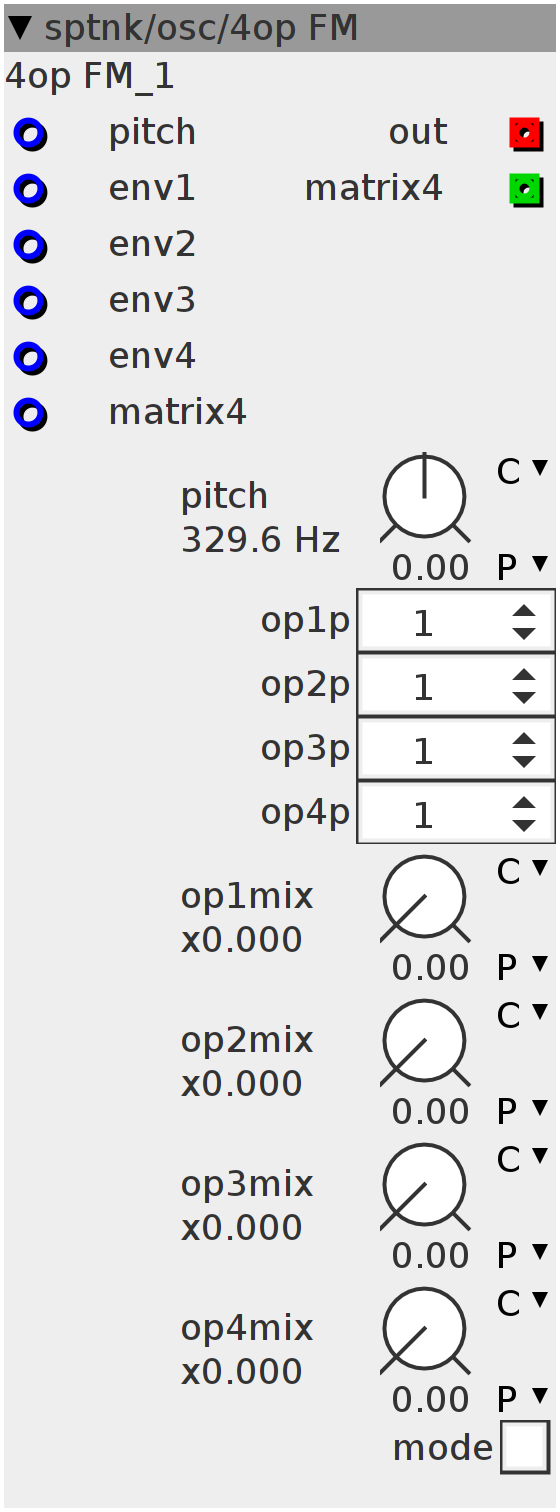4op FM
4 operator FM/PM synthesizer, with freely configurable modulation path. See help file. Tags: fm pm synthesizer matrix 4 operator
Inlets
frac32 pitch CV
frac32 connect to some envelope to drive operator 1
frac32 connect to some envelope to drive operator 2
frac32 connect to some envelope to drive operator 3
frac32 connect to some envelope to drive operator 4
frac32 connect to the output of matrix row 4 object
Outlets
frac32buffer audio out
int32 connect to the input of matrix row 4 object
Parameters
int32 pitch multiplier for operator 1
int32 pitch multiplier for operator 2
int32 pitch multiplier for operator 3
int32 pitch multiplier for operator 4
frac32.u.map.gain output mix amount for operator 1
frac32.u.map.gain output mix amount for operator 2
frac32.u.map.gain output mix amount for operator 3
frac32.u.map.gain output mix amount for operator 4
bool32.tgl switch between PM (off) and FM mode. Classic DX sounds are achieved with PM mode, while FM is less stable and more quirky
frac32.s.map.pitch base pitch for the oscillator
int32_t matrix[4][4] = {{0, 0, 0, 0}, {0, 0, 0, 0}, {0, 0, 0, 0}, {0, 0, 0, 0}};
int32_t tempv[4] = {0, 0, 0, 0};
int32_t temps = 0;
int sel = 0;
int32_t freq[4] = {0, 0, 0, 0};
uint32_t phase[4] = {0, 0, 0, 0};
uint32_t wave[4] = {0, 0, 0, 0};
uint32_t wave_old[4] = {0, 0, 0, 0};
int32_t envelope[4] = {0, 0, 0, 0};
int32_t envelope_old[4] = {0, 0, 0, 0};
int32_t increment[4] = {0, 0, 0, 0};
uint32_t gain[4] = {0, 0, 0, 0};// modmatrix handling section
matrix[sel >> 2][sel - ((sel >> 2) << 2)] = inlet_matrix4 << 1;
sel += 1;
if (sel == 16)
sel = 0;
outlet_matrix4 = sel;
// pitch handling section
MTOFEXTENDED(param_pitch + inlet_pitch, temps);
freq[0] = temps * param_op1p;
freq[1] = temps * param_op2p;
freq[2] = temps * param_op3p;
freq[3] = temps * param_op4p;
increment[0] = (inlet_env1 - envelope_old[0]) >> 4;
increment[1] = (inlet_env2 - envelope_old[1]) >> 4;
increment[2] = (inlet_env3 - envelope_old[2]) >> 4;
increment[3] = (inlet_env4 - envelope_old[3]) >> 4;
for (int i = 0; i < 4; i++)
envelope[i] = envelope_old[i];
envelope_old[0] = inlet_env1;
envelope_old[1] = inlet_env2;
envelope_old[2] = inlet_env3;
envelope_old[3] = inlet_env4;
gain[0] = param_op1mix;
gain[1] = param_op2mix;
gain[2] = param_op3mix;
gain[3] = param_op4mix;// actual fm handling
for (int i = 0; i < 4; i++) {
phase[i] += freq[i];
temps = 0;
if (param_mode) {
for (int j = 0; j < 4; j++)
if (i != j)
phase[i] = ___SMMLA(matrix[i][j] << 3, wave_old[j] << 4, phase[i]);
SINE2TINTERP((___SMMUL(matrix[i][i] << 3, wave_old[i] << 3) << 3) +
phase[i],
wave[i]);
} else {
for (int j = 0; j < 4; j++)
temps += ___SMMUL(matrix[i][j] << ((i != j) ? 3 : 1), wave_old[j] << 4);
SINE2TINTERP((temps << 4) + phase[i], wave[i]);
}
wave[i] = ___SMMUL(wave[i], envelope[i]);
envelope[i] += increment[i];
}
// final output handling
temps = 0;
for (int i = 0; i < 4; i++) {
wave_old[i] = wave[i];
temps = ___SMMLA(wave_old[i], gain[i], temps);
}
outlet_out = temps << 1;